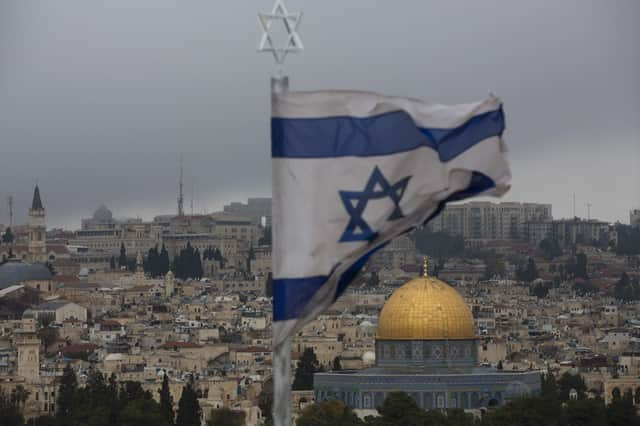Canon Ian Ellis: Christians face assaults from Holy Land radicals


The declaration released last December was headed: ‘Statement on the Current Threat to the Christian Presence in the Holy Land.’
Who could not be both struck and disturbed by such words?
The church leaders said that Christian believers in the region had become the target of frequent and sustained attacks by fringe radical groups, stating that since 2012 there had been “countless incidents of physical and verbal assaults” against clergy as well as attacks on Christian churches.
Advertisement
Hide AdAdvertisement
Hide AdThe Jerusalem church leaders also claimed that such tactics were being used by “radical groups in a systematic attempt to drive the Christian community out of Jerusalem and other parts of the Holy Land”.
The statement was a genuine cri de coeur.
Subsequently, an example of the attacks on church buildings was given in a letter published in The Sunday Times by Archbishop of Canterbury Justin Welby and Anglican Archbishop in Jerusalem Hosam Naoum when they described how someone had lit a fire in the Church of All Nations in the Garden of Gethsemane, where Jesus had prayed on the night before his crucifixion.
Such desecration of a particularly sacred place is indeed shocking.
The Church of All Nations is built on the site of two previous churches at this location, one built in the 4th century and the next in the 14th century.
Advertisement
Hide AdAdvertisement
Hide AdThe Jerusalem church leaders in their statement said they gratefully acknowledged “the declared commitment of the Israeli government to uphold a safe and secure home for Christians in the Holy Land and to preserve the Christian community as an integral part of the tapestry of the local community”.
Yet they went on to express “grave concern” at what they described as the failure of local politicians, officials and law enforcement agencies to curb the activities of radical groups.
The declared that the aim of those groups, they said, has been to diminish the local Christian presence, “often using underhanded dealings and intimidation tactics to evict residents from their homes, dramatically decreasing the Christian presence, and further disrupting the historic pilgrim routes between Bethlehem and Jerusalem”.
The reports, from church sources of such integrity, witness to a devastating form of sectarianism.
Advertisement
Hide AdAdvertisement
Hide AdThe church leaders also pointed out that Christian pilgrimage and tourism bring great benefits to Israel’s economy.
In light of all these circumstances, the Jerusalem church leaders very reasonably requested an urgent dialogue with local authorities to counter the activities of radical groups.
However, according to a BBC report, the Israeli government suggested that the church leaders’ statement was irresponsible as their comments “could lead to violence and bring harm to innocent people” .
Undeterred by this response, the Greek Orthodox Patriarch of Jerusalem, Theophilos III, challenged the Israeli government’s stance. Referring to many good Christian works in the city, such as looking after the elderly, welcoming refugees and caring for the destitute, Theophilos claimed “Zionist extremists” were intent on extinguishing “the light of the Christian community from the Old City”.
Advertisement
Hide AdAdvertisement
Hide AdThe present walls of Jerusalem’s Old City were built by the Sultan Suleiman (1494-1566) with six gates in addition to the existing Golden Gate which was constructed in the 6th century.
This is a really historic place.
Describing Jerusalem as the home of Judaism, Christianity and Islam, and therefore as “the spiritual capital of the world”, Theophilus acknowledged that the radicals’ intentions did not represent the position of the state of Israel or of the Jewish people, but his article was a clarion call for greater protection for the Christian church in Jerusalem.
President Herzog said that Interior Minister Ayelet Shaked joined him in assuring the church leaders that any forms of attacks or threats would be resisted.
Yet, while The Times of Israel reported on 21st February that the Israel Nature and Parks Authority was suspending a controversial plan to expand a national park on to church-owned lands in East Jerusalem, including a considerable section of the Mount of Olives, the retreat only followed church-led objections.
Advertisement
Hide AdAdvertisement
Hide AdThe project was denounced by local church leaders as aiming to “confiscate and nationalize one of the holiest sites for Christianity and alter its nature ”.
The Mount of Olives, of course, has many biblical associations.
Concerns about the plan had reportedly also been voiced by a visiting delegation of US politicians who discussed the matter with Israeli Prime Minister Naftali Bennett.
The Jewish Chronicle reported Ohad Zemet, spokesman for the Israeli Embassy in the UK, as stating last November: “While Christians and other minority groups are persecuted across the Middle East, Israel is the only country in the region where the Christian population is growing.”
Advertisement
Hide AdAdvertisement
Hide AdNonetheless, at the beginning of this month, the Jerusalem church leaders called on governmental authorities “to exercise policies of religious tolerance, restraint of force and de-escalation of conflict”, commending them “to the extent that they have already done so”.
The profound meaning of Jerusalem within Christianity surely entitles the churches to expect any groupings acting against Christian interests to desist immediately.
l Canon Ian Ellis is a former editor of The Church of Ireland Gazette. Ruth Dudley Edwards is away